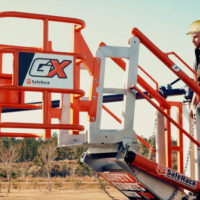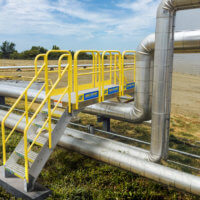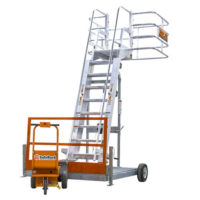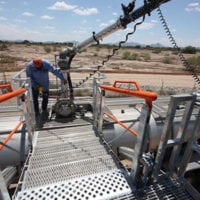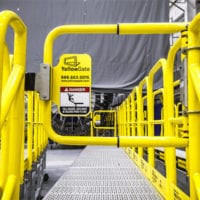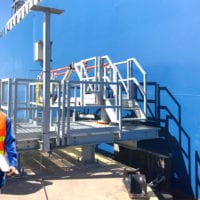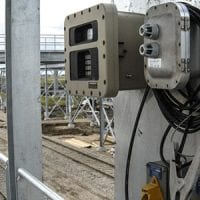Shut-off valves in natural gas facilities are typically located in hard-to-reach areas or at heights, making it difficult for workers to access them. Work platforms are needed to provide a safe and stable surface for workers to stand on while they perform maintenance or repair tasks on the valves.
The natural gas power industry involves the production of electricity from natural gas, a fossil fuel widely used as a source of energy around the world. Natural gas comprises almost 25 percent of the world’s energy generation because it’s a clean-burning fuel that produces lower greenhouse gas emissions and air pollutants than other fossil fuels such as coal and oil.
The natural gas power industry involves many players, including exploration and production companies like Exxon Mobil, pipelines and other infrastructure companies like Enbridge, power plant operators, and electricity retailers.
Using drilling techniques, natural gas extraction from underground deposits is then transported to power plants through pipelines or tanker trucks. Due to natural gas being very volatile, transporting it can be hazardous. To ensure the safety of those driving trucks that carry natural gas, many of these trucks are equipped with baffles to absorb any excess movement and minimize sloshing to reduce the risk of accidents caused by natural gas changing direction too quickly.
Upon reaching the power plant, the natural gas is burned, which produces steam that drives a turbine to generate electricity. The electricity is then transmitted to customers through a transmission and distribution lines network.
There are several natural gas power plants, including simple-cycle, combined-cycle, and cogeneration plants. Simple-cycle plants are the most basic type of natural gas power plant, and they involve burning natural gas to produce steam that drives a turbine. Combined-cycle plants are more efficient and use the waste heat from the turbine to generate additional electricity. Cogeneration plants have electricity and heat, often used in industrial applications.
Without work platforms in natural gas facilities, workers may have to use ladders, scaffolding, or other improvised means to access the valves, which can be dangerous and increase the risk of accidents or injuries. Work platforms provide a safer and more efficient way for workers to reach the valves, and they can also be equipped with guardrails, handrails, and other safety features to reduce the risk of accidents further.
For several reasons, worker safety should be a top priority in natural gas facilities. Natural gas is a flammable and explosive substance, and accidents or incidents involving natural gas can have serious consequences for workers and the public.
In addition, natural gas facilities often involve working at heights, handling heavy equipment, and performing tasks in confined spaces, all of which can pose risks to workers’ safety. By prioritizing worker safety, companies and facility operators can help prevent accidents, injuries, and fatalities and ensure their employees can work safely and effectively.
Legal and regulatory requirements also mandate the prioritization of worker safety in natural gas facilities. Occupational health and safety laws and regulations require companies and facility operators to provide a safe work environment for their employees and to take steps to prevent accidents and injuries.
Failing to prioritize worker safety can result in significant fines, legal liability, and damage to a company’s reputation. Therefore, natural gas facility operators need to prioritize worker safety to meet their legal and regulatory obligations and protect the well-being of their employees.
In addition, work platforms can be designed to be easily moved or repositioned as needed, which can be helpful when working in large or complex facilities where valves are juxtaposed in somewhat hard-to-reach areas.
Overall, work platforms are essential for ensuring the safety and efficiency of maintenance and repair work in natural gas facilities. The natural gas power industry plays a significant role in meeting global energy demand and helping to reduce the use of more polluting fossil fuels such as coal and oil. However, natural gas extraction and service can also negatively impact the environment and local communities. Despite the ongoing debates about the role of natural gas in transitioning to a more sustainable energy system, no doubt that the industry is growing at an exponential pace. If you need to consult experts to ensure that your natural gas facilities have the necessary work platforms to keep your workers safe, contact Saferack today.



